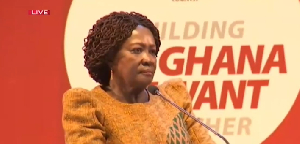Opinions of Thursday, 27 February 2014
Columnist: Banienuba, Samwin J.
NPP Vetting Committee and Paul Afoko’s Chairmanship bid
Between the rock and a hard place: the NPP Vetting Committee and Paul Afoko’s Chairmanship bid
By Samwin J Banienuba
Once upon a time there was a party named the United Party (UP) in the history of Ghana. It was so-called because it united a myriad of different parties and traditions whose individual visions had been narrowed to their own and separate peculiarities. They included the Asante based National Liberation Movement (NLM), the Fante based Aborigines Rights Protection Society, the northern based Northern People’s Party (NPP), the voltaic or Ewe based Togoland Congress, the Ga based Ga Shifimokpee, the religious based Muslim Association Party and some other albeit much smaller local groups. The rallying call that seemed to unite the UP was anything but Kwame Nkrumah and his Convention People's Party (CPP).
On a flip side the newly found unity played into nation building, bridged or at least papered ethnic divides and gave the UP a national character that each of the unifying fractions woefully lacked until then. Only the CPP of Kwame Nkrumah could truly be described as a national party that pulled together the nation in the common cause of national independence and continental unity. All others represented parochial stakes of which the national and continental were fringe interests if they existed at all. This disturbed the Ghanaian and pan-African sentiments of Kwame Nkrumah to a point where he inadvertently fostered the UP with the Avoidance of Discrimination Act of 1957 which criminalised political parties organised along ethnic, religious or regional lines.
For a country that was emerging from the divide and rule politics of the colonialist there was something both refreshing and promising about the sense of unity discovered by these peripheral parties. After all they could have each decided to name change or apply other requisites of the Act to acquire a national semblance and still perpetuate their shared trademark notoriety of opposing everything Nkrumah represented. But no, they reasoned better and wiser! In unity there is strength and S D Dombo whose NPP was the official opposition with 15 seats in the National Assembly remarkably surrendered leadership right of the UP to K A Busia of the NLM which had 12 seats only. Dombo then charitably accepted to play second fiddle as Busia’s deputy in the new party.
The UP has since evolved in the political journey of the country and has taken many shades and guises in the course of history. Today the NPP is not the Northern People’s Party. It is the National Patriotic Party for which the bloodline is fixedly rooted in the Patriotic Front Party (PFP) of the late ‘70s and early ‘80s, the Progress Party (PP) of the late ‘60s and early ‘70s through to the UP and all the way back to the NLM which was nothing else but an appendage of the earlier United Gold Coast Convention (UGCC). In so doing the party has elected to inextricably align itself with the political culture established by Busia and by J B Danquah of the UGCC from which Kwame Nkrumah broke ranks for their elitist and conservative posturing.
With such straight and single line narrative of the heritage of the party, the role of all those other fractional elements that once constituted the UP seems lost in a legacy that should otherwise have been richer and fuller had they all remained counted and accounted for or well packaged for broader national appeal. Of course, in latter days the name Dombo has been on occasions thrown into the mix albeit sceptics would argue it has mostly been a momentary flash of afterthought or in exercise of political expedience, without as much the same measure of sentimentality attached to the contributions of Busia and Danquah.
Rightly or wrongly, the impression that all of this has given away is that the NPP of today is Akancentric whatever that means. Some have even been more circumscribed in dismissively name calling it an Asante-Akyem party. Never mind that Busia was none of the above, at the time of his birth the Wenchi Kingdom where he hailed from was part of the Asante Confederacy. In more recent times J A Kufuor and Nana Akuffo-Addo have succeeded each other as leaders of the party and are perceived to represent the Asante and Akyem caucuses that complete the holy matrimony. Comparative analysis makes more uncomfortable reading for the NPP as the CPP tradition and the current ruling National Democratic Congress (NDC) of J J Rawlings fame are the only ones to have ever put forward non-Akan Presidential candidates and effectively produced Presidents out of them. The moment the northern Aliu Mahama, Vice President to Kufuor, was challenged by as many as sixteen (16) others for the right to lead the NPP in 2007, his pedigree and experience notwithstanding as the number two gentleman of the land and "chief apprentice" for 8 good years, it deepened the perception that minority ethnicities, least of all those from Dombo’s north, had very little chance of actualising political ambitions in the NPP especially when Aliu lost and lost miserably. Or if they do, then they should be willing to do a Dombo and deputise humbly. After all “humility is not a weakness”, the words of Aliu when announcing his candidature in the Presidential primaries.
Yet that brings Paul Afoko and his bid to become Chairman of the NPP into unusual focus. He seems well connected and respected throughout the echelons of the party and actually sits in its National Council, a position that has arguably given him insights into and experience of political strategy and party management. He is a successful businessman by many accounts and by other accounts a generous philanthropist in party affairs. Very few would disagree he is pro-active and possibly a highly valued member of the NPP. But he also hails from the Upper East Region or what used to be called the Upper Region when it included the Upper West Region where Dombo came from in the north. If he wins the chairmanship bid he will record history as the first person ever from the north to chair the party, but will he?
Recent media reports suggest Afoko is already the reason for a hold up in completing the vetting of candidates for the all-important position of the Chair. The reason, according to these reports, is an anonymous petition to the Vetting Committee alleging he is an ex-convict, or is it an ex-patient of a rehabilitation centre in the United Kingdom or both? No one else seems privy to the actual content of the petition except the author(s), the Vetting Committee and possibly a select few kingpins of the party. It therefore becomes difficult, if not outright impossible, for observers and commentators to argue the merits of the petition per se. What is not difficult to posit is that it inevitably puts the Vetting Committee in an unenviable position between the rock and a very hard place.
Obviously the Committee must be wary of the non-amusing perceptions of the party within the country and it must know that perception gives undeniably true knowledge. It would want to vindicate itself and attest that the NPP is a party of principle and merit in which everyone who is a member can aspire to its highest offices irrespective of ethnicity, religion or regional background. Having said that, it would in addition naturally want to do so as a party of law in ensuring that the very people who aim to lead the party meet party and national constitutional requirements and not be vulnerable to the backlash of opposition propaganda.
Two questions it could do without in this predicament are why this petition is targeted against Afoko as such and why now. And while the countryman of Dombo and Aliu has to “hover through the fog and filthy air” of politicking in the oldest democratic tradition of party politics in Ghana, the Vetting Committee has the more difficult task of rising to the occasion of their calling by proving beyond reasonable doubt that fair is not foul neither is foul fair.
The writer is a freelance International Relations analyst and political commentator












